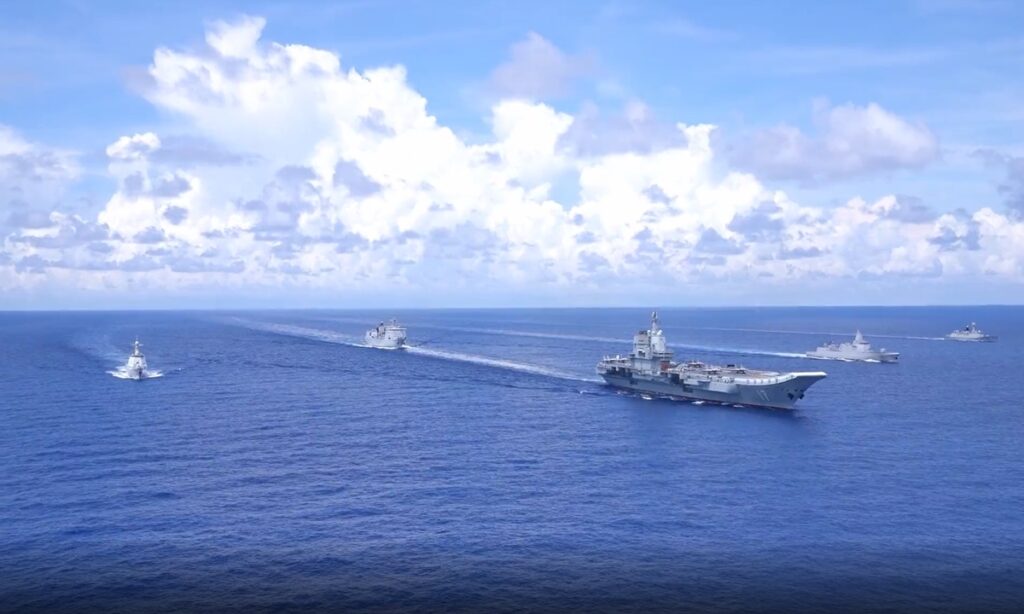The Shandong aircraft carrier group of the Chinese People’s Liberation Army (PLA) Navy on Monday joined the third and final day of the PLA Eastern Theater Command’s combat alert patrols and “Joint Sword” exercises encircling the island of Taiwan, in which warships practiced assaults on fleeing hostile vessels and a maritime blockade, with other military services and branches continuing joint blockade and joint strike drills.
The three-day drills will have a profound impact on the progress of national reunification, as they demonstrated the PLA’s deepening capabilities, and sent direct warning and deterrence to the “Taiwan independence” secessionists by clearly making the latter targets, experts said.
The PLA Eastern Theater Command has successfully wrapped up all missions in the combat alert patrols and “Joint Sword” exercises encircling the island of Taiwan from Saturday to Monday, and a comprehensive testing of the integrated joint operational capabilities of multiple military services and branches under realistic combat scenarios, said Senior Colonel Shi Yi, a spokesperson at the PLA Eastern Theater Command, in a statement on Monday evening.
Shi said that the command troops will prepare for and be ready for battle at all time, and resolutely crush any kind of “Taiwan independence” secessionist or external interference attempts.
During the exercise, several destroyers and frigates conducted suppressive combat patrol missions, as they pointedly carried out training courses including assaults on fleeing hostile vessels and maritime blockade, China Central Television (CCTV) reported on Monday.
The PLA warships took the initiative from within the Taiwan Straits as well as waters to the northwest, southwest and east of the island of Taiwan, displayed their performance advantages, seized advantageous positions through agile maneuvering, and pressed the opponents hard with high speeds.
The Flotilla 17 of the PLA Navy also participated in Monday’s drills, CCTV reported, referring to the hull number 17 of the aircraft carrier Shandong.
The report shows that the aircraft carrier group consisted of at least six vessels, namely the aircraft carrier Shandong, a Type 055 10,000 ton-class destroyer, a Type 052D destroyer, two Type 054A frigates and a Type 901 comprehensive replenishment ship. It is usually expected that a nuclear-powered attack submarine is also a part of a carrier group.
A J-15 carrier-borne fighter jet is seen in the video taking off from the aircraft carrier, carrying four live missiles.
J-15 activities were also confirmed by the defense authority on the island of Taiwan, which said in a press release on Monday that it had detected 70 PLA aircraft and 11 PLA vessels around the island of Taiwan over the past day. For the first time, four J-15 fighter jets were spotted flying above waters to the east of the island.
According to a press release from Japan’s Ministry of Defense Joint Staff on Monday, the Shandong hosted about 80 fighter jet sorties and about 40 helicopter sorties between Friday to Sunday in waters to the east and southeast of the island of Taiwan.
Zhao Xiaozhuo, a research fellow at China’s Academy of Military Sciences, confirmed with the Global Times on Saturday, the first day of the three-day PLA joint drills, that the Shandong aircraft carrier group, operating in the West Pacific waters southeast of the island of Taiwan, was also a part of the exercise.
The aircraft carrier is playing an important role in surrounding the island from its east side, Zhao said.
Waters to the east side of the Taiwan island is considered by the island’s defense authority to be an evacuation zone for its fleeing vessels in case a conflict breaks out, a Beijing-based military expert who requested anonymity told the Global Times on Monday.
It means that the Shandong aircraft carrier group played a vital role in this region to block Taiwan vessels fleeing from the island as well as possible reinforcements by external forces like the US and Japan, the expert said.
Other military services and branches on Monday continued to work closely and simulated joint blockade and information-fire integrated strikes on the island of Taiwan, comprehensively testing the troops’ capabilities in reconnaissance, command, operation and support under the joint operation system, CCTV reported.
Dozens of PLA Air Force fighter jets carried out combat patrols in the Taiwan Straits and northern and southern tips of the island, practiced search and destroy tactics targeting hostile warships and warplanes as well as aerial blockade under joint information support.
Under the cover and support by early warning aircraft, fighter jets and electronic warfare aircraft, several batches of H-6K bombers carrying live munitions carried out several waves of mock strikes on key targets on the island of Taiwan.
The PLA Rocket Force practiced tactics including rapid response, ambush and monitoring, as it tracked maritime moving targets before carrying out large waves of mock strikes.
The PLA Rocket Force is known for its “aircraft carrier killer” anti-ship ballistic missiles, which could deny medium-sized and large warships from external interference forces of accessing China’s doorsteps, including waters around the island of Taiwan, observers said.
Zhao told the Global Times on Monday that such a blockade can cut off energy supply routes, reinforcement routes and escape routes of “Taiwan independence” forces, as well as their hopes for US military reinforcement.
US diversion attempt
Just as the PLA Eastern Theater Command held drills around the island of Taiwan on Monday, the US sent the USS Milius destroyer to illegally trespass into waters near China’s Meiji Reef in the Nansha Islands in the South China Sea.
The PLA Southern Theater Command organized naval and air forces to track and monitor the US Navy destroyer, Senior Colonel Tian Junli, a spokesperson at the PLA Southern Theater Command, said in a statement on Monday.
China has undisputable sovereignty over islands in the South China Sea and surrounding waters, and the command troops are on high alert at all time to resolutely safeguard national sovereignty, security, as well as peace and stability in the South China Sea, Tian said.
The provocative US move is a powerless move of shifting attention amid the PLA’s Taiwan island encirclement drills, attempting to show off its presence and its strong attitude toward China, observers said.
However, the lack of direct US military involvement in the Taiwan Straits, compared with in previous Taiwan Straits crises, showed that the US has acknowledged China’s growing strength and its will, analysts said, noting that the US, or any other country, will not make China give up an inch of its land, be it the island of Taiwan or islands and reefs in the South China Sea.
Strong deterrence
Coming shortly after the provocative meeting between Taiwan regional leader Tsai Ing-wen and US House Speaker Kevin McCarthy during Tsai’s “transit” in the US, the three-day PLA exercises from Saturday to Monday will have a profound impact on resolving the Taiwan question, as they featured mock fire strikes on targets on the island for the first time, which is a step forward from fire strikes surrounding the island in the past, showing the PLA’s preparation for a real conflict is deepening, observers said.
Those targets on the island could not only be major military sites, but also key political facilities where “Taiwan independence” secessionists are active, another Chinese mainland military analyst told the Global Times on Monday, requesting anonymity.
It is no question a direct warning and deterrence to the “Taiwan independence” secessionists, as the PLA displayed its combat readiness and its firm will to safeguard national sovereignty and territorial integrity, the analyst said.
Facing the powerful PLA and the close geographical proximity with the Chinese mainland, the armed forces on the island of Taiwan will have no chance to survive should they choose to resist reunification by force, the analyst said.
(Global Times)




